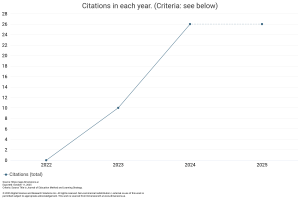Role of Geography Education in Raising Environmental Awareness: A Literature Review
DOI:
https://doi.org/10.59653/jemls.v2i01.293Keywords:
Environment, Geography Education, Role of GeographersAbstract
This research is a literature review that aims to explore the significant role of Geography Education in increasing environmental awareness. This research uses a descriptive Qualitative Method by conducting a literature study related to this research. The results of the literature analysis show that geography education provides an important foundation for students to understand the complex relationship between humans and the natural environment, as well as its impact on the sustainability of the Earth. In addition, it helps students identify global and local environmental problems, provides insight into workable solutions, and encourages an environmentally responsible attitude. This study confirms that geography education has great potential in shaping a generation that is environmentally conscious, ready to participate in nature conservation efforts, and address the increasingly pressing environmental challenges of the future.
Downloads
References
Ardoin, N. M., & Bowers, A. W. (2020). Early childhood environmental education: A systematic review of the research literature. Educational Research Review, 31, 100353. https://doi.org/10.1016/j.edurev.2020.100353
CENGIZ KAHRAMAN. (2016). Role of Geography in Environmental Education. International Journal of Humanities, Arts and Social Sciences, 2(4). https://doi.org/10.20469/ijhss.2.20001-4
Fu, B. (2020). Promoting Geography for Sustainability. Geography and Sustainability, 1(1), 1–7. https://doi.org/10.1016/j.geosus.2020.02.003
Fu, L., Sun, Z., Zha, L., Liu, F., He, L., Sun, X., & Jing, X. (2020). Environmental awareness and pro-environmental behavior within China’s road freight transportation industry: Moderating role of perceived policy effectiveness. Journal of Cleaner Production, 252, 119796. https://doi.org/10.1016/j.jclepro.2019.119796
Gustavo, G. J. P., & Rakuasa, H. (2023). Disaster Education and the Role of Geographers: A Step Toward a Disaster Resilient Ambon City: A Review. Journal of Education Method and Learning Strategy, 1(03), 183–192. https://doi.org/10.59653/jemls.v1i03.238
Hermawan, I. (2019). Metodologi Penelitian Pendidikan (Kualitatif, Kuantitatif dan Mixed Method). Hidayatul Quran.
Hong, P., Schmid, B., De Laender, F., Eisenhauer, N., Zhang, X., Chen, H., Craven, D., De Boeck, H. J., Hautier, Y., Petchey, O. L., Reich, P. B., Steudel, B., Striebel, M., Thakur, M. P., & Wang, S. (2022). Biodiversity promotes ecosystem functioning despite environmental change. Ecology Letters, 25(2), 555–569. https://doi.org/10.1111/ele.13936
Jorgenson, S. N., Stephens, J. C., & White, B. (2019). Environmental education in transition: A critical review of recent research on climate change and energy education. The Journal of Environmental Education, 50(3), 160–171. https://doi.org/10.1080/00958964.2019.1604478
Latue, P. C., Manakane, S. E., & Rakuasa, H. (2023). Utilization of Meso-scale Weather Models in Urban Development Policy and Planning: A Review. Sinergi International Journal of Economics, 1(2), 56–63. https://doi.org/10.61194/economics.v1i2.68
Latue, T., Latue, P., Liwan, S., Manakane, S., & Rakuasa, H. (2023). Role of Geographers in the Analysis and Modeling of the Spread of Communicable Diseases (Malaria & COVID-19) in Ambon City: A Spatial Approach for Epidemiological Analysis. International Journal of Multidisciplinary Approach Research and Science, 1(03), 419–428. https://doi.org/10.59653/ijmars.v1i03.198
Manakane, S. E., Latue, P. C., & Rakuasa, H. (2023). Integrating Geospatial Technology in Learning: An Innovation to Improve Understanding of Geography Concepts. Sinergi International Journal of Education, 1(2), 60–74. https://doi.org/10.61194/education.v1i2.70
Meadows, M. E. (2020). Geography Education for Sustainable Development. Geography and Sustainability, 1(1), 88–92. https://doi.org/10.1016/j.geosus.2020.02.001
Piotrowska, I., Cichoń, M., Abramowicz, D., & Sypniewski, J. (2019). Challenges in Geography Education – A Review of Research Problems. Quaestiones Geographicae, 38(1), 71–84. https://doi.org/10.2478/quageo-2019-0009
Rakuasa, Heinrich, and P. C. L. (2023). Regional Development Planning and Policy in the Aspects of Vulnerability and Disaster Resilient Cities: A Review. Sinergi International Journal of Communication Sciences, 1(2), 64–77. https://doi.org/10.61194/ijcs.v1i2.52
Rakuasa, H. (2023a). Dynamics of Medical Geography Development in Indonesia: Exploring the Interaction between Geographical Factors and Public Health. Nusantara Journal of Behavioral and Social Sciences, 2(3), 81–86.
Rakuasa, H. (2023b). Integration of Artificial Intelligence in Geography Learning: Challenges and Opportunities. Sinergi International Journal of Education, 1(2), 75–83. https://doi.org/10.61194/education.v1i2.71
Rakuasa, H., & Mehdila, M. C. (2023). Penerapan Pendidikan Mitigasi Bencana Gempa Bumi untuk Siswa dan Guru di SD Negeri 1 Poka, Kota Ambon, Provinsi Maluku. Jurnal Pengabdian Masyarakat Indonesia, 3(3), 441–446. https://doi.org/10.52436/1.jpmi.1138
Ramadhan, S., Sukma, E., & Indriyani, V. (2019). Environmental education and disaster mitigation through language learning. IOP Conference Series: Earth and Environmental Science, 314(1), 012054. https://doi.org/10.1088/1755-1315/314/1/012054
Schultz, R. B., & DeMers, M. N. (2020). Transitioning from Emergency Remote Learning to Deep Online Learning Experiences in Geography Education. Journal of Geography, 119(5), 142–146. https://doi.org/10.1080/00221341.2020.1813791
Susan E Manakane, Philia Christi Latue, Glendy Somae, H. R. (2023). The Role of Geography Research in Supporting Sustainable Development in Ambon City, Indonesia: A Review. Sinergi International Journal of Economics, 1(2), 64–75. https://doi.org/10.61194/economics.v1i2.67
Wulandari, A. A., Pertuak, A. C., & Rakuasa, H. (2023). Climate Change and its Impact on Human Health: A Medical Geography Perspective. Journal of Health Science and Medical Therapy, 1(02), 80–90. https://doi.org/10.59653/jhsmt.v1i02.279
Downloads
Published
How to Cite
Issue
Section
License
Copyright (c) 2023 Heinrich Rakuasa, Philia Christi Latue

This work is licensed under a Creative Commons Attribution-ShareAlike 4.0 International License.
Authors who publish with this journal agree to the following terms:
- Authors retain copyright and grant the journal right of first publication with the work simultaneously licensed under a Creative Commons Attribution-ShareAlike that allows others to share the work with an acknowledgement of the work's authorship and initial publication in this journal.
- Authors are able to enter into separate, additional contractual arrangements for the non-exclusive distribution of the journal's published version of the work (e.g., post it to an institutional repository or publish it in a book), with an acknowledgement of its initial publication in this journal.
- Authors are permitted and encouraged to post their work online (e.g., in institutional repositories or on their website) prior to and during the submission process, as it can lead to productive exchanges, as well as earlier and greater citation of published work (See The Effect of Open Access).
























